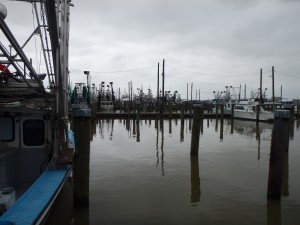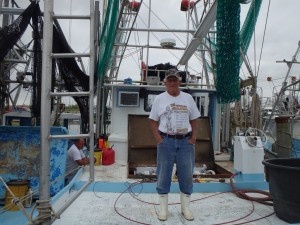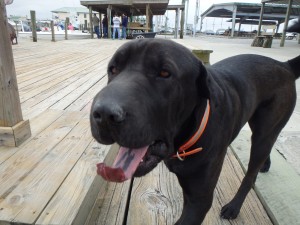
http://columbuscameragroup.com/kiev60/ The commercial fishermen's marina.
http://thelittersitter.com/wp.php I ate lunch at Crawgators, the Venice Marina’s restaurant, when it opened; I talked to the waitresses about life in Venice, Hurricane Katrina, how cold it was (for them – it was probably 70), how much they liked New Orleans. The sandwich they gave me was served on Texas toast, each slice of bread an inch-and-a-half thick. Old but tough-looking men came in and ate on the deck outside. They seemed to have a uniform – white t-shirt, jeans, white rubber boots and a camouflage baseball cap that said “Venice.” They smoked after lunch, and their legs moved nervously in their chairs.
I felt bored. Nothing was happening. “Since there are so few charter boats coming in,” said one waitress (I was seated at the bar and could talk to both of them), “why don’t you try the other side? That’s where the shrimp boats are docked.” So I biked around to the other side of the harbor, and found a few men working on their boats. They all said no – not going out today – but I had fun talking with one older gentleman who appeared to have come down for the express purpose of having someone to listen to him. He was speaking as I arrived, while two men – his son and grandson – were apparently doing some purposeful thing with tools underneath the deck of his ship.
“You heah at the wrong time,” the old man said. “It’s pretty quiet now the season ain’t open. But in a month all these boats will be going out fuh shrimp. Y’all come back then they’ll all take you out to the Guff.”
“Is there a town out there? I have a place called ‘Pilottown’ on my maps.”
“Theah was. Theah’s nothin’ out theah now.”
“What happened to it?”
“Destroyed in the hurricane.”
“Hurricane Katrina?”
“Betsy. 1965. Theah’s nothing theah now but a ‘bandoned towuh.”
“So there is no more Pilottown?”
“No, suh.”
“I read a description of some people who spent Hurricane Betsy out there in Pilottown, at the Coast Guard Station.”
“A couple people died too. One of them who was drow-ned, I don’t think they evah found that body. Now when they tell us we gotta go fuh a stome, we go.”
“So everyone evacuated for Hurricane Katrina?”
“Oh, yeah. This was all Guff heah then – the watuh was ovuh everything. You wouldn’t need to have someone tek you out to the Guff then! And it wus [worse] now. Really the Guff right theah,” he said, pointing to the marsh. “Really the Guff ain’t south of us, the Guff is right theah awmost aw the way to Nawlins. We used to have all bayous, we used to catch squiwwuls all round heah.”
“Yes, pretty hard to imagine a squirrel here now. No trees.” If there were squirrels, they must have been living on oak acorns. The live oaks are astoundingly tolerant of salt intrusion but they cannot take standing in water. There were no live oaks anywhere near anymore.
“Dat’s what I’m sayin, the trees gone now. People say ‘why don’t you go someplace ess’ but when you a fishuhman you got no choice you got to live wheah the watuh is. That’s how we live. Some of us nevuh wukked fuh anybody ess. My son he nevuh wukked a day in his life fuh nobody. I took him out when he was a bahwoy and now his son wukk too.”
He introduced himself as Acy Cooper. (His son, I learn, is something of a local figure). We spoke about what I did, the Cajuns, my plan to go upriver, putting sediment back into the bayous, and the relative health of the bayous of the “Chafalaya,” as he called it, which I would be visiting later on the trip. He was interested in the fact that I was interested in all this. “They shoulda been thinkin’ of this fifty yeahs ago,” he said. “Now it’s all gone.”
“So can I ask you a question?” I said. “What’s with the white boots? I see everyone around here wearing white rubber boots.” His son and grandson were wearing them too.
“These? They Coonass reba.”
That didn’t make much sense to me. Coonass rebar? “I’m sorry I didn’t catch that.”
“We call ‘em ‘Coonass Reeboks.’” (The term “Coonass” is Cajun slang for a Cajun).
He let me get a picture of his “Coonass Reeboks.” “Hey, do you drink? If you have a favorite bar here in town I’ll buy you your drinks tonight. I’d love to hear any stories you want to tell me. Life down here is not like life in New York, I’ll tell you that.”
“Haha nah nah. Going out to bahs, you should talk to my grandson.” He then paused and said, “But he’s polly only aftuh pussy!” The way he said it I felt drinks were not going to happen. I said my goodbyes and headed off. “Keep on askin’ round,” he said. “Someone’ll take you out.”
I biked on back to the fish-cleaning place. I hung out with Doc – short for “Dock Master” – the harbor’s dog; he was a friendly beastie and seemed entirely pleased that someone was paying attention to him. I saw a police officer speeding around in a tiny little flatboat which said, PLAQUEMINES PARISH SHERIFF. I spoke with another boatowner, he said no, he had things to do. A charter boat came in bearing a fishing party of four Indian men; they all posed for photos with their fish. I asked the captain when he was done with his clients, but I could see my chances were poor: his girlfriend and kids had shown up to bring him home from work. He said he would normally, but today he was going straight home.
So the day passed at the Venice marina. People came, people went. People came in to the restaurant, the police officer spoke with people, I met the manager of the marina. But mostly I just sat there. Then one of the boatowners I had spoken with earlier in the afternoon was walking back to his boat and saw me.
“You still waitin’ for someone to take you out to the Guff?”
“Yup.”
“Come heah, lessgo. I take you.”


One Trackback/Pingback
[…] So began one of the great rides of my life, with Roland, my pilot for this expedition. He absolutely refused any kind of monetary compensation; but I did get his address, and will send him some maple syrup. He was a man about fifty, with an intelligent look in his eyes. His accent sometimes sounded like a Southern black man’s to me, but he was white. Many Louisiana accents are shared across the races. Pulling out of Venice. […]
Post a Comment